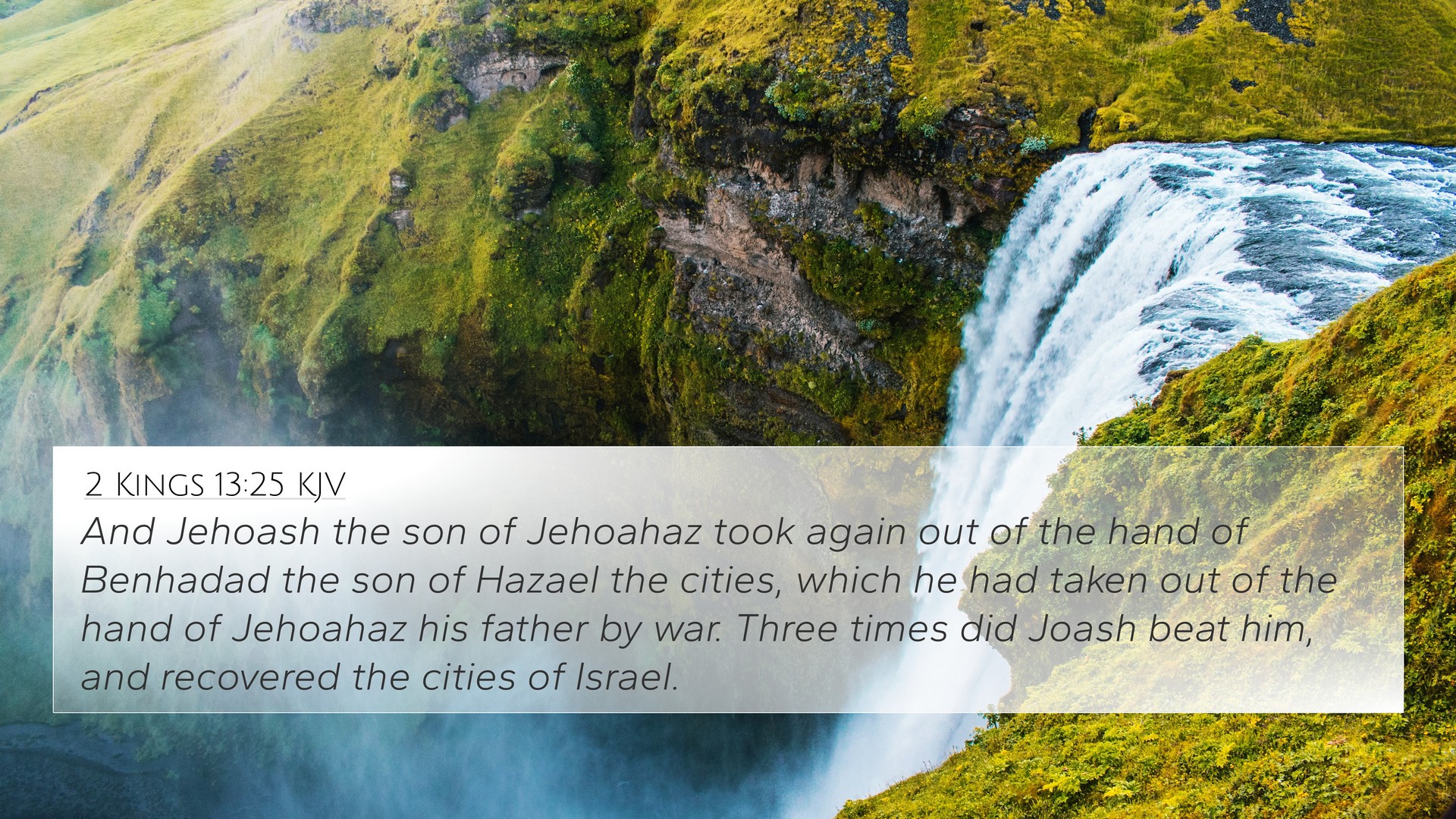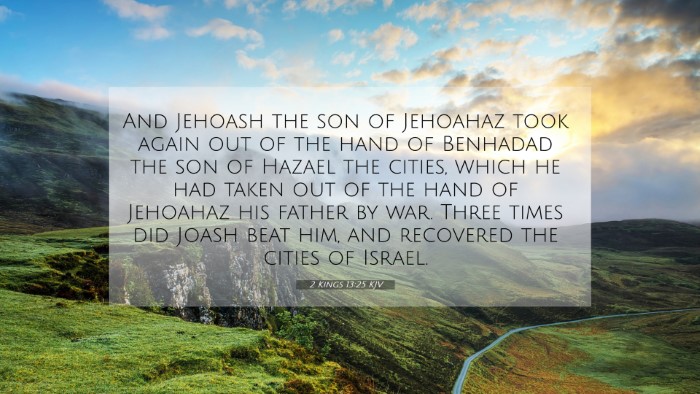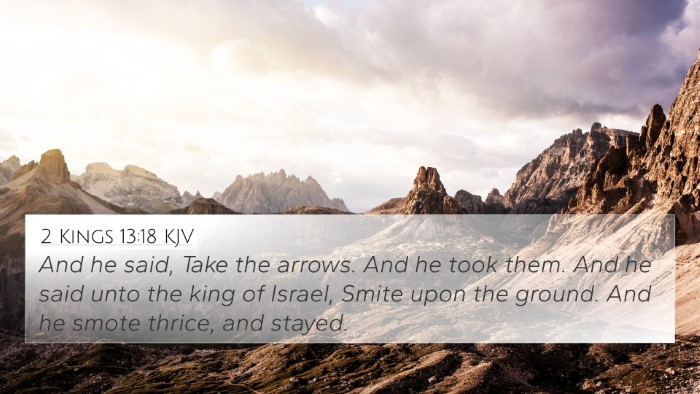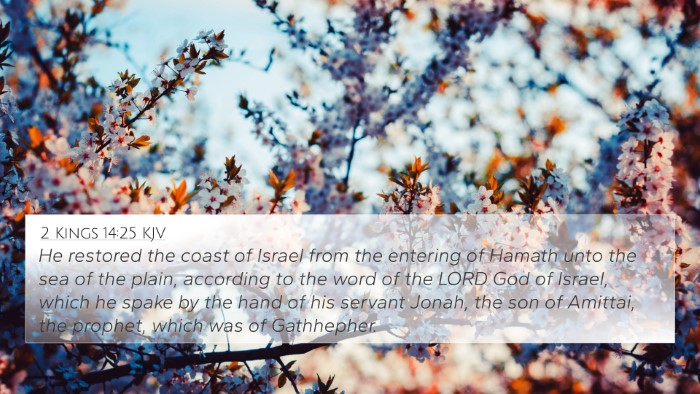Understanding 2 Kings 13:25
Verse: "And Jehoash the son of Jehoahaz took again out of the hand of Benhadad the son of Hazael the cities which he had taken out of the hand of Jehoahaz his father by war. Three times did Jehoash beat him, and recovered the cities of Israel." (2 Kings 13:25, KJV)
Summary and Interpretation
This verse encapsulates a significant moment in Israel's history during the reign of Jehoash. The restoration of the cities signifies both military success and a fulfillment of God's promises to His people through the prophetic words delivered by Elisha.
Key Themes
- Divine Intervention: The success of Jehoash is directly connected to God’s covenant with Israel.
- Restoration: Jehoash’s victories symbolize a restoration of Israel's territory and influence, demonstrating God’s mercy even amidst a wayward people.
- Prophetic Assurance: The victories align with Elisha's prophecies, showing the importance of prophetic guidance in Israel's history.
Commentary Insights
Matthew Henry
Henry notes that this passage illustrates God’s fidelity to His people despite their disobedience. Jehoash’s victories were granted not merely due to his military prowess but as a fulfillment of prophetic favor.
Albert Barnes
Barnes stresses that the phrase "took again" emphasizes the recurring theme of loss and recovery in Israel's history. He highlights the importance of acknowledging God's hand in Jehoash's achievements, leading to the restoration of Israel's fortunes.
Adam Clarke
Clarke points out that this victory over Benhadad is symbolic of God's overarching plan for Israel. The narrative reflects both immediate historical contexts and larger spiritual truths regarding the faithfulness and judgment of God.
Cross-References
2 Kings 13:25 can be cross-referenced with the following verses to understand deeper connections:
- 2 Kings 10:32-33 - Relates to the context of Israel's territorial struggles.
- 2 Kings 14:25 - Illustrates the continuation of restoration through subsequent kings.
- Isaiah 54:7 - God’s promise of restoration even amidst judgment.
- Jeremiah 30:3 - Foretelling Israel's restoration from captivity.
- Amos 9:14-15 - Prophecy concerning the future restoration of Israel.
- Ezekiel 36:8-11 - A depiction of God's restoration promises.
- Joel 2:25 - Assurance of recovery of what has been lost due to circumstances.
Thematic Connections
This passage connects with various themes throughout the Scriptures:
- Victory through Faith: The narrative shows that spiritual success comes from alignment with God's will.
- Judgment and Mercy: While Israel faced consequences for sin, God continually offered opportunities for restoration.
- Legacy of Leadership: The actions of Jehoash build upon the previous successes and failures of his father Jehoahaz.
Bible Verse Parallels
These parallels with other Bible verses may enhance understanding:
- 1 Chronicles 5:20 - Illustrates the involvement of God in battles.
- Psalm 60:12 - Affirms reliance on God for military success.
- Psalm 44:3 - Recognizes that victories come not by sword but by God's might.
Conclusion
In summary, 2 Kings 13:25 serves as a testament to God's unyielding faithfulness. Jehoash's military accomplishments come forth as evidence of God's grace, underlining the importance of prophetic direction and the continual hope for restoration in the lives of His people.
Related Concepts in Cross-Referencing
To explore how different Bible verses are interconnected, using tools for Bible cross-referencing such as a Bible concordance or Bible cross-reference guide can significantly enhance study.
- Engaging in cross-reference Bible study methods can reveal the richness of biblical themes.
- Identify connections between Old and New Testament through extensive Bible reference resources.
As you reflect on 2 Kings 13:25, consider how these interconnected scriptures provide a deeper narrative about God's relationship with Israel, His ways of restoration, and His ultimate plan for redemption echoed throughout the Bible.





